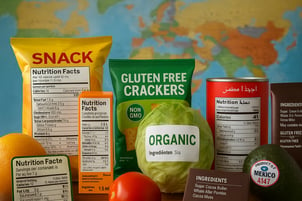What is Specification Management in a PLM Software?
Consumer trust and the brand’s credibility is the strongest driving force in today’s world. Marketing claims can build a product’s reputation or break it. "100% organic," "clinically proven," or "fastest in the market" are some of the marketing claims examples, which have been successful for the purpose of converting potential customers. Now the question is, what are marketing claims? Marketing claims are the descriptions provided by the brand regarding the product or service's characteristics, advantages, or attributes - meant to impact the consumer's opinion and of course their buying choice.
But first, what are advertising claims? They are statements made by brands about a product or service’s characteristics, benefits, or performance - meant to influence consumer perception and buying decisions. These claims must be true, verifiable, and aligned with regulatory standards, because in marketing, truth is not just ethical, it is non-negotiable.
Types of Marketing Claims Consumers Encounter
Marketing claims are of various types, each made to highlight specific product attributes and to navigate the interests of target consumer. Here is a detailed explanation of the most common types:
Health and Wellness Claims
These claims suggest a product can improve health, prevent illness, or contribute to overall well-being. The instances such as “boosts immunity” “lowers cholesterol” or “gluten-free” are regularly seen in food, supplements, skincare, and fitness products - These forms of claim marketing must be backed with evidence to ensure safety and accuracy.
Environmental and Ethical Claims
Brands are talking about their sustainability and ethical qualities more and more as consumer awareness grows. Claims such as, "eco-friendly" ,"cruelty-free", "biodegradable" or "fair trade certified" are used in this respect. These statements should be in line with environmental regulations and refrain from greenwashing.
Performance and Quality Claims
A product's timelessness, durability, or the fact that it is better than others are confirmed by these. "Lasts 24 hours" "5x stronger" or "best-in-class" are the types of claims here. Visibility, third-party stamp of approval, or clear benchmark data are necessary to sustain the credibility of these relatively bigger claims.
Price and Value Claims
These highlight savings in expenses as well as the value proposition offered, such as "best value" "50% off" or "lowest price guaranteed". Although these are often used in advertising, they must have the support of the pricing structure that is clear and serves the best as a proof.
What’s Required for Marketing Claims Substantiation?
For any claim to be legal and ethical, it must be supported with reliable, factual evidence. Substantiation ensures transparency, protects consumers, and maintains the authenticity of the claims on your products.
→ The Role of Consumer Rights and Regulations
Consumer protection laws make certain that people are not manipulated or conned by false advertisements. This legal framework gives consumers the power to be informed and at the same time obliges brands to prove what they claim. This is the first step to the transparency and building trust in marketing. The aforementioned rights have remained the source of these values until now.
→ The Significance of Certifications and Third-Party Verifications
It is independent certifications and verifications that proves a brand's claims. The symbols of "USDA Organic", "Leaping Bunny" or "FSSAI Approved" give consumers a sense of security concerning the products, that they have undergone specific, standardised evaluation by certified bodies. Especially, they serve to ensure health, safety, and ethics.
Regulatory Aspect Around Marketing Claims
Marketing claims are governed by laws that vary across countries but generally follow a strict protocol - claims must be substantiated with scientific data, industry standards, and consumer studies. This regulation ensures brands can’t make exaggerated or false statements just to drive sales.
◊ Key Regulatory Bodies
The Central Regulatory Bodies in Question
-
India: Advertising Standards Council of India (ASCI), Food Safety and Standards Authority of India (FSSAI), Central Drugs Standard Control Organization (CDSCO)
-
USA: Federal Trade Commission (FTC), Food and Drug Administration (FDA)
-
Europe: European Food Safety Authority (EFSA), European Medicines Agency (EMA)
These organisations approve advertising standards, support the development of labels and go through fraudulent and false advertisements.
◊ Industry-Specific Rules
It is a known fact that rules in different industries are specific. Below are a few examples:
🍿Food & Beverages: Should comply with FSSAI (India), FDA (USA) regulations related to nutritional values/statements, and health benefits.
💄Cosmetics & Skincare: Statements like “dermatologically-tested” or “hypoallergenic” should be backed by dermatological certificates.
💊Pharmaceuticals: It is necessary to have the verification from clinical trials and the approval of authorities before they become curative.
Common Mistakes to Avoid in Marketing Claims
Even with the best intentions, brands can slip up while crafting their marketing narratives. Here are some common pitfalls:
Exaggeration without Evidence: Claiming “instant results” or “miracle cure” without solid data.
Misuse of Scientific Terms: Throwing around terms like “clinically proven” or “scientifically backed” without actual studies.
Overpromising Outcomes: Promising more than what the product can realistically deliver.
Ignoring Regulatory Guidelines: Not aligning claims with legal requirements or industry standards.
Using Inconsistent Messaging: Conflicting claims across product labels, websites, and ads confuse consumers and invite scrutiny.
The Digital Dilemma
Digital advertising faces unique challenges due to rapid content distribution. ASCI reported a 75% compliance rate for digital ads, lower than print and TV. The recent Supreme Court directive requiring self-declaration certificates for new ads highlights the need for greater transparency and accountability.
Challenges of Managing Marketing Claims
Crafting accurate and compliant claims isn’t always straightforward. Brands often face:
Inconsistent Data Across Departments: Lack of alignment between R&D, marketing, and compliance teams can lead to mixed messages and unverified claims going public.
Risks of Unverified or Exaggerated Claims: Rushing to market without substantiation can expose the brand to scrutiny or backlash.
Legal and Reputational Consequences: One misleading claim can lead to lawsuits, fines, loss of consumer trust, or damage to brand equity.
Best Practices for Accurate and Compliant Marketing Claims
To ensure marketing claims are effective, legal, and trustworthy, brands should follow these best practices, mentioned in the following infographic:
By combining transparency with verification, brands can use marketing claims to strengthen credibility - not jeopardise it.
How PLM Software Streamlines Marketing Claims Management
Modern Product Lifecycle Management (PLM) systems come with Digital Asset Management (DAM) capabilities that streamline claim handling. They centralise storage of product images, approved copy, regulatory documentation, and claim-specific visuals.
This ensures teams always use accurate, approved materials—reducing the risk of outdated or non-compliant content reaching the public. Platforms like Plevenn support consistency, version control, and regulatory alignment throughout the lifecycle of marketing claims.
Conclusion
Today’s consumers are more informed, vocal, and empowered than ever before. With growing access to information, they demand transparency and truth in every product claim. This shift calls for both brands and buyers to adopt a culture of critical thinking and fact-checking.
For brands, this means prioritising honest, well-substantiated marketing practices over flashy, unverified promises. Because in the long run, integrity builds trust—and trust builds loyalty.
Tags:
May 6, 2025 12:08:06 PM







